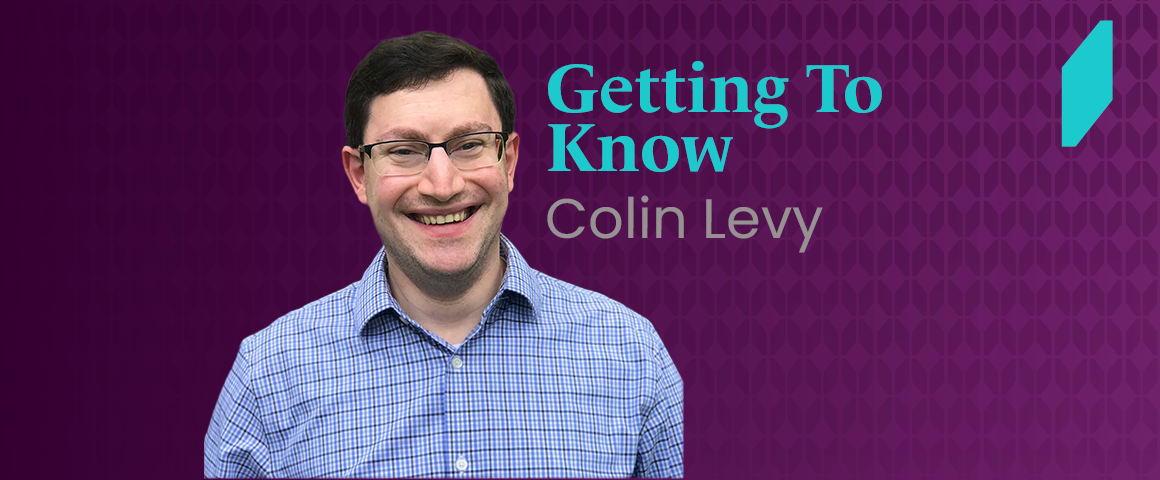Getting to Know Colin Levy
Meet Colin, one of our newest additions to the Malbek team! You may know Colin from his heavy social media presence, or his countless speaking affairs. Actually, he was even a Contract Lens podcast guest! To get to know this legal tech star, we asked him seven questions. Here are his answers:
1. How would you describe yourself personally and professionally?
I am blunt, outspoken, empathetic, and unafraid to challenge the status quo. I have a bias towards action. I’d like to also think that I am authentic, meaning that anything that I say publicly would be the same things I would tell you in person or privately. I also have learned to not rely or seek out the approval of others. I am who I am and I am proud of who I am. I have worked hard to overcome challenges in my life both personally and professionally and it is my overcoming of those challenges that have, in part, defined who I now am. I also do not shy away from admitting my imperfections and knowledge gaps. A hallmark of our inherent humanity is our inherent imperfection.
2. What is one thing you wish every legal professional in the tech space knew?
Technology is not the answer to everything. Technology is a tool. Like any other tool, it is most effectively when used properly. What this means in practice is that it is important to meet people where they are, understanding their level of tech fluency and competency as well as understanding how to help connect potential users with the right tools for them and for the users to learn how to use those tools effectively. Legal professionals whether they are working for a firm or for a department or for a tech vendor have much to gain from working collaboratively with other functions and with other legal professionals in other industries when it comes to using technology effectively. This learning journey is not one to undertake alone or in a silo. One should never assume that a technology will simply speak for itself.
3. When not working, what do you do?
When not working, I love to write and I am currently working on some longer writing projects right now. I also love to go for walks and hikes. Traveling also brings me a sense of wonder and peace, particularly to places that carry some meaning for me or to places that I have not been before. I also have been known to dance when I am feeling the song that I am listening to. I also (and yes, I will admit this!) like to watch mindless trashy tv at night. No, I will not be providing examples of such shows here, but suffice to say that certain TV networks have provided growing families of such shows.
4. WHY MALBEK?
I’ve been a lawyer for over 11 years now. The majority of that time has been spent in-house focused on transactions. That is a fancy way of saying that I have lived and breathed contracting for a significant period of time. During that time I have also been involved in developing and/or testing two proprietary contract-management focused systems and used several others. On the product side, Malbek’s product is second to none in its intuitiveness, seamlessness, and robust functionality. On the people side, the Malbek team is innovative and dedicated to its products, of course, but they also are some of the most supportive, intelligent, and fun people I’ve had the honor of getting to know and now working for and with. I am delighted and humbled to now be a part of the impressive and growing Malbek team.
5. IF YOU COULD CHANGE ONE THING ABOUT THE WORLD, WHAT WOULD IT BE?
Admittedly there are numerous things that I would like to change about the world. However, if I had to choose only one it would probably be for the world to be less tribal and driven by fear and for it to be driven by knowledge-seeking and collaboration. I don’t necessarily mean that I wish the world to be “nicer” per se, but rather more based on the pursuit of innovation, learning, and erudition. Far too frequently today’s world seems to be driven by division and a seeking of wanting to only hear and read what one wants to hear and read. I am one who enjoys being exposed to a wide range of sources to have a more informed and broader perspective about the world and about those who inhabit this world that we all call home. All I can do is simply try to do my part to help achieve the change that I want to see and attract others to help me along the way.
6. What do you see the future of contract lifecycle management will be?
This is a broad question, but an important one. There are several approaches one could take to answering this question. I’ll take the approach of pointing to three themes underlying where I see things going. First, I see contract lifecycle management encompassing more and more tasks performed by the sales, finance, legal, and procurement functions. In practical terms this means I see contract lifecycle management tools becoming ever more platform based and within that platform offering a range of tools from more traditional contract management tasks like deadline tracking, contract organization and repository functionality, and basic data analysis for things like average contract values and term lengths to more dynamic and robust reporting on things like contract cycle times, commonly negotiated contractual provisions as well as offering automated contract negotiation and red lining and finally certain other tasks like contract signing and post-execution implementation.
Second, I see contract lifecycle management becoming not just something seen as nice to have but as table stakes for legal departments and firms. Business runs on data and analytics and the legal industry can no longer afford to be a laggard when it comes to use of data and using data analysis to drive decision-making, not just internally, but for its clients as well. This means that contract lifecycle management vendors will need to work harder than ever at understanding not just what these users want the tools to provide now, but in the future. Vendors will also need to be dedicated to continuing to educate their intended users about the benefits of these tools and how to welcome their use and not fear their use. Finally, a third theme that is emerging is contract lifecycle management tools incorporating more elements of AI into their systems. This means making more and more use of things like natural language processing and reinforcement learning as well as more advanced things like neural networks. It is important to understand that we are just at the start of understanding AI and its capabilities in the context of contracting as well as many, many other areas.
7. Red or white wine?
As much as it pains me to say this given Malbek’s name, I tend to favor white wine, particularly dry white wines. Truth be told, though, my drink of choice is not wine, but smoky, peaty Islay single-malt scotch!






